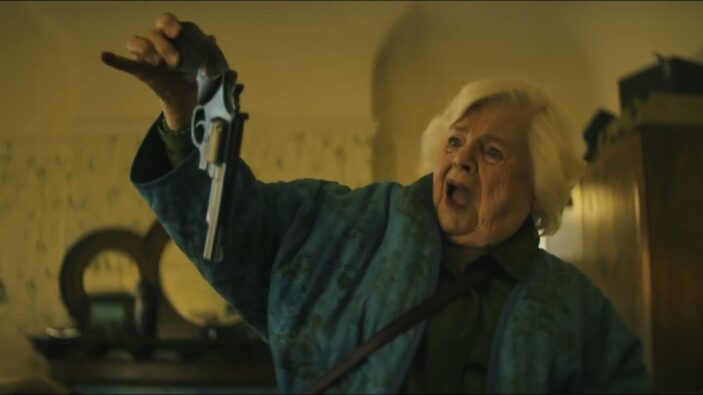
Though it leans into the action/thriller genre with a supreme wink, Thelma, Josh Margolin‘s frequently hilarious, always poignant ode to his own grandmother (and, clearly, a love of the action genre), is never spoofing the films it so evidently is earning its laughs from; and it’s that sweetness and keen sense of reinvention that helps drive this surprisingly-at-times tense laugher to fruition.
We meet the titular Thelma (so wonderfully embodied by June Squibb) and quickly gather a sense of her character from the opening interaction with her grandson, Daniel (Fred Hechinger, memorable as Steve Zahn and Connie Britton’s socially awkward son in the first season of The White Lotus), as he assists the technologically inept, but still fiercely independent widow around her computer; “What’s an inbox?”, she so sternly asks. Despite their 7-decade generational gap, there’s an ease to Daniel and Thelma’s relationship, and the brief moment we see of them lounging around together watching Tom Cruise and his signature run in one of the later Mission: Impossible films is our first inkling of Margolin’s love of the genre, the surprising mentality it soon adopts, and the non-judgemental bond that exists between grandmother and grandson.
Because of how Daniel has been painted as a character, we’re ahead of the narrative curve when Thelma receives a phone call the next day from a different-sounding Daniel, claiming his nose has been broken and is currently in jail, and if she doesn’t send $10,000 to a post office box he’ll be locked up. She calls her family in a panic – Daniel, daughter Grace (Parker Posey, always a treat), and son-in-law Alan (Clark Gregg) – and when no one answers, she takes it upon herself to post the money as soon as possible. Soon after, when everyone has caught up to speed on what exactly has happened and it’s clear that Thelma has been the victim of a scam call, she feels a mixture of relief, foolishness and patronization. But it’s nothing a photo of Tom Cruise can’t cure – she notes a newspaper article with his face and the headline “Mission: Possible” – and so she does what any other scam victim would do (or wishes they could do): Track the source down and get the money back herself.
Whilst the majority of her friends have since passed, she has at least one companion left in Ben (Richard Roundtree, this serving as his final on-screen role following his death in October last year), who she visits at his retirement village, where she learns he has quite the plum set-up, including a starring role as Daddy Warbucks in an amateur production of “Annie”. Thelma isn’t exactly fussed on such details though, and she’s mainly there for Ben’s mobility scooter, leading to an alarming “action” sequence within the walls of the home where she nabs his wheels and he briskly walks after her. He’s got his big stage debut at 8pm, but he’s more concerned in helping Thelma retrieve her money, leading to the duo trekking across the city at a sensible speed.
As Margolin leans into the sensibilities of the genre, Thelma continually proves an exciting, intricate watch as he employs certain technological advancements to heighten the situational comedy at hand. Bluetooth hearing aids are used as walkie-talkies. She throws her following-family off the trail by disposing of her attached health bracelet. And, in one of the film’s funniest moments, she utilises Ben as a distraction to an old, going-senile acquaintance in order to ransack her home to find a weapon. The payoff being the old broad has no idea what day of the week it is, let alone cottoning on to Thelma rummaging upstairs; that, and seeing Squibb ever so gingerly do a “body roll” over a bed frame.
As it culminates in a showdown of sorts with the individuals that took Thelma’s money (a certain name in the credits should easily indicate just which actor will pop up as the criminal “mastermind”), Margolin, ever so sweetly, drives home the importance of family and the reality of mortality (and morality). There’s a real sadness to the reasoning behind Thelma’s scam call, and whilst Margolin’s script never excuses this behaviour, the film never villainises either. It continually chooses good, and Squibb, in all her glory, epitomises such; though, it does allow for a brilliant take on the walk-away-from-an-explosion stereotype that so many action films adopt, capping off with an audible gag that I can only imagine will play like gold to a full audience.
Detailing the pitfalls of ageing with dignity, grace and genuine humour, Thelma is a gem of a movie that should earn universal appeal, even if audiences of a certain generation will relate to it on a more personal level. This is a film that loves its character, especially the unique Thelma, which makes all the more sense when the closing credits aim for a final hug of our hearts with footage of the real Thelma, who Margolin wrote the film for and about, celebrating her near-infallible spirit with all the warmth and jocularity she so clearly deserves and evokes.
![]()
![]()
![]()
![]()
![]()
FOUR STARS (OUT OF FIVE)
Thelma is screening as part of this year’s Sydney Film Festival, running between June 5th and 16th, 2024. For more information head to the official SFF page.
Thelma was originally reviewed as part of this year’s Sundance Film Festival coverage.
